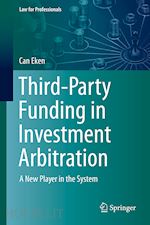
Questo prodotto usufruisce delle SPEDIZIONI GRATIS
selezionando l'opzione Corriere Veloce in fase di ordine.
Pagabile anche con Carta della cultura giovani e del merito, 18App Bonus Cultura e Carta del Docente
This book offers a reference guide that can be consulted by all users of Third-Party Funding (TPF), lawyers, students, and other interested readers. In addition to analyzing TPF issues holistically, with both doctrinal and empirical methods, the book provides important empirical data on funders through interviews conducted with nearly thirty people working for third-party funders. It reveals a range of potential problems and lays out how to address them in the form of guidelines.
TPF has become a significant element of litigation and arbitration systems around the world for both theoretical and practical reasons. Specifically, in the context of investment arbitration, the latest studies suggest that a large percentage of investment arbitration cases are sponsored by funders. Despite its prevalence, TPF has raised procedural and ethical concerns in the investment regime. One of the caveats is that when states lose against an investor, their taxpayers are who pay for the investment arbitration award, essentially transferring the wealth of the states to the investor, and now part of this wealth goes to the funder. Whether or not the funder shares this wealth is anyone’s guess and represents an ethical consideration.
Apart from ethical challenges, TPF has also raised significant procedural problems in investment arbitration. As funders enter the equation of arbitration proceedings in the investment regime, consideration must be given to this new player and how TPF affects investment arbitration.
Overall, the book assesses TPF in its entirety: background information, the main procedural issues and case law, ethical aspects, and empirical research on TPF, including the funder’s perspective. By doing so, it sheds new light on under-researched issues and offers essential guidance to help orient legal policy.
1 The new phenomenon in investment arbitration.- 2 Definition, history and basic mechanism of tpf.- 3 Existing and potential procedural problems in tpf in investment arbitration: analysis of the case law.- 4 Empirical research in the TPF market.- 5 Third-party funding: threat or facilitator of the system - an ethical dilemma.- 6 Conclusion.- 7 The best practice guideline for funders operating in investment arbitration.- Appendix - investment arbitration cases.
Dr Can Eken is an assistant professor at Durham Law School, Durham University. His research and teaching mainly focus on international commercial arbitration, investment law and third-party funding. His research interests also cover online dispute resolution and alternative dispute resolution mechanisms with a specific focus on commercial mediation.
As a triple-qualified lawyer admitted to practise law as an attorney in California and Turkey, and as a solicitor in England and Wales, and a fellow of the Chartered Institute of Arbitrators (FCIArb), he is an expert on international arbitration proceedings and has proven experience in both common law and civil law jurisdictions. He is listed in LexisNexis as an arbitration expert. A winner of the Postgraduate Research Output Award 2021 and several other international recognitions, he has extensively researched, given lectures and training on international commercial arbitration, investment law, third-party funding, contracts, online dispute resolution and torts in Turkey, the United Kingdom, Hong Kong, Macau, Singapore, Israel, Canada, Australia, India, Uzbekistan, and Kazakhstan. He is fully equipped to act as a sole arbitrator, party-appointed arbitrator, and counsel in international arbitration proceedings. He has served as a counsel and legal adviser in complex international commercial arbitration cases.
Dr Eken is the deputy director and founding member of the Durham International Dispute Resolution Institute (DIDRI), and he is also on the panel of arbitrators at the Shanghai International Arbitration Centre and Thailand Arbitration Centre. He has been recognised by the rising arbitrators initiative as a member in 2023. Dr Eken coaches the Durham Law School team every year to attend the Willem C. Vis International Commercial Arbitration Moot in Vienna since 2022. He serves as a peer reviewer for the Asian Pacific Law Review, and also on the Executive Secretariat of the Asia Pacific FDI Network. He is also a Central Asian Legal Research (CALR) Fellow at Tashkent Law School, Uzbekistan, a Fellow of the Wolfson Research Institute for Health and Wellbeing, and a Senior Common Room (SCR) member at the University College (Castle) at Durham University. Dr Eken also serves as a member of the Protem Committee for the inaugural Asia International Arbitration Centre Court of Arbitration.











Il sito utilizza cookie ed altri strumenti di tracciamento che raccolgono informazioni dal dispositivo dell’utente. Oltre ai cookie tecnici ed analitici aggregati, strettamente necessari per il funzionamento di questo sito web, previo consenso dell’utente possono essere installati cookie di profilazione e marketing e cookie dei social media. Cliccando su “Accetto tutti i cookie” saranno attivate tutte le categorie di cookie. Per accettare solo deterninate categorie di cookie, cliccare invece su “Impostazioni cookie”. Chiudendo il banner o continuando a navigare saranno installati solo cookie tecnici. Per maggiori dettagli, consultare la Cookie Policy.